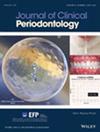Do Systemic Antibiotics Offer Benefits to the Surgical Treatment of Peri‐Implantitis? A Systematic Review With Meta‐Analyses
IF 6.8
1区 医学
Q1 DENTISTRY, ORAL SURGERY & MEDICINE
引用次数: 0
Abstract
AimTo assess the potential benefit of using adjunct systemic antibiotics in surgical peri‐implantitis treatment.Materials and MethodsSix databases were searched (December 2024) for randomised/non‐randomised clinical studies. After duplicate study selection, data extraction and risk‐of‐bias assessment, random‐effects meta‐analyses of odds ratios (ORs) or mean differences (MDs) and their 95% confidence intervals (CIs) were performed, followed by the analysis of certainty of evidence.ResultsSeven studies (three randomised and four non‐randomised, comprising 595 patients and 1388 implants) were included. Systemic antibiotics were associated with greater short‐term treatment success (全身性抗生素对种植体周围炎的手术治疗有好处吗?Meta分析的系统评价
目的评估在手术治疗种植体周围炎中使用辅助全身性抗生素的潜在益处。材料和方法检索6个数据库(2024年12月)进行随机/非随机临床研究。在重复研究选择、数据提取和偏倚风险评估后,进行优势比(ORs)或平均差异(MDs)及其95%置信区间(ci)的随机效应meta分析,然后进行证据确定性分析。结果纳入7项研究(3项随机和4项非随机,包括595名患者和1388个植入物)。全身性抗生素与更大的短学期应承担的相关治疗成功率(n = 5;或= 2.33;95%可信区间:1.29 - -4.21),骨增益(n = 4, MD = 0.37毫米;95%置信区间CI: -0.68 - -0.07),增加骨水平稳定(n = 3;或= 2.73;95%可信区间:1.50 - -4.99),减少出血在探测(n = 6;或= 0.49;95%可信区间:0.31 - -0.78),降低脓在探测(n = 3;或= 0.33;95%可信区间:0.18 - -0.61),增加牙龈萎缩(n = 3; MD = 0.18毫米;95%置信区间CI: 0 - 0.36毫米)(p & lt; 0.05)。全身性抗生素似乎只对表面改良的种植体有益(or:改良4.10 vs反转0.79),并且没有长期的益处(≥3年)。最后,一项试验发现抗生素可能会增加腹泻的风险。结论:来自随机/非随机研究的证据似乎表明,在短期内(1-2年),全身抗生素有利于手术治疗种植体周围炎,特别是对于表面修饰的种植体,而关于不良反应的数据很少。没有观察到实质性的长期获益(≥3年)。关于全身性抗生素作为手术治疗种植体周围炎的辅助治疗的潜在益处仍然存在不确定性。
本文章由计算机程序翻译,如有差异,请以英文原文为准。
求助全文
约1分钟内获得全文
求助全文
来源期刊

Journal of Clinical Periodontology
医学-牙科与口腔外科
CiteScore
13.30
自引率
10.40%
发文量
175
审稿时长
3-8 weeks
期刊介绍:
Journal of Clinical Periodontology was founded by the British, Dutch, French, German, Scandinavian, and Swiss Societies of Periodontology.
The aim of the Journal of Clinical Periodontology is to provide the platform for exchange of scientific and clinical progress in the field of Periodontology and allied disciplines, and to do so at the highest possible level. The Journal also aims to facilitate the application of new scientific knowledge to the daily practice of the concerned disciplines and addresses both practicing clinicians and academics. The Journal is the official publication of the European Federation of Periodontology but wishes to retain its international scope.
The Journal publishes original contributions of high scientific merit in the fields of periodontology and implant dentistry. Its scope encompasses the physiology and pathology of the periodontium, the tissue integration of dental implants, the biology and the modulation of periodontal and alveolar bone healing and regeneration, diagnosis, epidemiology, prevention and therapy of periodontal disease, the clinical aspects of tooth replacement with dental implants, and the comprehensive rehabilitation of the periodontal patient. Review articles by experts on new developments in basic and applied periodontal science and associated dental disciplines, advances in periodontal or implant techniques and procedures, and case reports which illustrate important new information are also welcome.
 求助内容:
求助内容: 应助结果提醒方式:
应助结果提醒方式:


